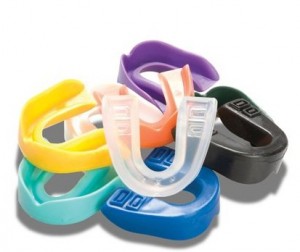Mouthguards in Sports Prevent Dental Injury
If You Play Hard, Wear a Guard: The Importance of Mouthguards in Sports
Injuries: It’s part of the game
It’s estimated that around 30 million children are involved in organized sports throughout the US. While these sports are important for building children’s’ confidence, team working skills, and physical endurance there is also an inherent risk of injury in many, if not all, of these sports. The American Academy of Pediatric Dentistry reports that of all childhood dental injuries reported, 10-39% of these are sports related. Although we can never completely remove all risk of dental injury from playing sports, we can significantly decrease the frequency and severity of these injuries with proper protective gear.
What is the cost of sports related dental injuries?
One of the most severe forms of sports related dental injuries is tooth avulsion. Avulsion is when a tooth is knocked completely out of the mouth. The National Youth Sports Safety Foundation has estimated that the cost of long-term treatment for an avulsed permanent tooth is anywhere from $5,000-$20,000. These treatments can include anything from root canal treatment, orthodontic treatment, or implant placement. All of those follow up appointments can also mean missed school time and inconvenience to both the child and the parent.
Who is at risk for sports related dental injuries?
Sports with more physical contact carry a greater risk of dental injury. It is because of this that many youth leagues are now requiring participants to wear mouth guards while playing. However, even sports that are not necessarily considered “contact sports” can lead to sports related dental injuries. In addition, there are certain children who are at greater risk of dental injuries. When considering all sports related dental injuries, the most common teeth that are affected are the maxillary (or upper) front teeth. Patients who have an excessive overjet (horizontal overlap) of the teeth carry a greater risk of dental injury. In other words, patients who have teeth that may tilt or lean outward have a significantly higher chance of damaging these teeth.
Mouthguards can significantly reduce the occurrence and severity of dental injuries

The American Academy of Pediatric Dentistry states that a mouthguard should be constructed to “protect the lips and intraoral tissues from bruising and laceration, to protect the teeth from crown fractures, root fractures, luxation and avulsions, to protect the jaw from fracture and dislocations, and provide support for edentulous space.” The mouthguard functions to absorb and dissipate the energy from impacts and because of this can help prevent jaw dislocations and even concussions.
The better it fits, the better it works: the benefit of customized mouthguards
Wearing mouthguards is an important tool in the prevention of dental injuries so getting an accurate fit is vital. If the mouthguard is too bulky or does not fit correctly the child is less likely to wear it. Although there are over the counter mouthguards available including semi-customizable “boil and bite” versions, these usually do not fit as well and are more bulky and cumbersome. Many patients report that the bulkier size makes them feel like they cannot breathe as well. The best mouthguards are ones that are custom-made for the patient and can be provided by a dental professional. The process involves taking an impression of the patient’s teeth so an exact model can be made, thus allowing the fabrication of a mouthguard that fits precisely onto the patient’s teeth. Because of the exact fit, the mouthguard will be more retentive and comfortable.
If you have any additional questions or would like more information on getting a customized mouthguard made for your child, contact our office by Online Appointment Request or call 214 618 5200. And don’t forget to tell us what color your want your mouthguard to be, that way we can see those team colors every time you smile!
